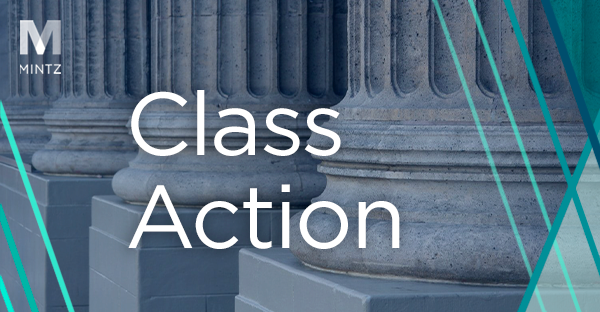
Class Action
Viewpoints
Filter by:
Session-Replay Class Action Tossed by the Eighth Circuit
February 21, 2025 | Blog | By Esteban Morales, Joshua Briones
In a recent appellate decision, Jones v. Bloomingdales.com, LLC, the Eighth Circuit has cast doubt over the merits of these lawsuits at the federal level.
Can a Consumer Plausibly Allege Your Product Labeling is False or Misleading Under California Law?
December 12, 2024 | Blog | By Paige Adaskaveg, Daniel Herling, Arameh Zargham O'Boyle, Sebastian Navarro
The following decisions provide useful guidance for crafting product labeling that is resilient to legal challenges brought under California’s consumer protection laws.
Arbitration Clauses and Class Action Waivers in Residential Leases: Are They Enforceable?
September 4, 2024 | Blog | By Mathilda McGee-Tubb, Janki Viroja
Landlords and property managers are increasingly adding arbitration clauses with class action waivers to their residential leases. These lease provisions can protect landlords from the significant time and costs associated with litigating claims brought by residents, including potential class claims that present high exposure risk for multifamily owners and managers. But the enforceability of these types of provisions remains an open question in many states.
District Court Denies Class Cert in TCPA Suit on Ascertainability Grounds
August 2, 2024 | Blog | By Joshua Briones, Esteban Morales, Nadia Zivkov
In a win for Defendant IQVIA, Inc., accused of allegedly sending faxes in violation of the Telephone Consumer Protection Act (TCPA), the United States District Court for the Eastern District of Pennsylvania denied Plaintiff Brian J. Lyngaas D.D.S.’s (Lyngaas) motion for class certification, agreeing with IQVIA that the class did not cross the Third Circuit’s threshold ascertainability requirement.
Fashion Nova’s Arbitration Clause Fades Away
March 1, 2024 | Blog | By Geoffrey Friedman, Matthew Hurley
Online retailers routinely include arbitration clauses in the terms of service for their website, seeking to send any consumer claims to arbitration and to eliminate a consumer’s right to file a class action lawsuit.
Significant Unruh Act and ADA Website Accessibility Ruling from the California Court of Appeal
August 23, 2022 | Blog | By Todd Rosenbaum, Adam B. Korn, Macklin W. Thornton
In a significant August 2022 ruling, the California Court of Appeal narrowed the reach of Title III of the Americans with Disabilities Act (ADA) and the Unruh Civil Rights Act (Unruh) as they apply to online-only businesses. The Appeals Court held in Martinez v. Cot’n Wash Inc. that the websites of online-only businesses are not places of public accommodation within the meaning of the ADA or with regard to Unruh. This decision is a welcome relief for small and medium-sized businesses throughout the country that have been frequent targets of demand letters and lawsuits from California plaintiffs.
A COVID-19 Ready Campus: Steps Colleges and Universities Should Take to Avoid Future Litigation Over Tuition and Fees
June 29, 2020 | Blog | By Mathilda McGee-Tubb
COVID-19 Tuition and Fees Lawsuits: Defending University Practices and Defeating Class Claims
June 26, 2020 | Blog | By Thomas Wintner, Mathilda McGee-Tubb
TCPA Class Action Update: Post ACA International, the TCPA’s Autodialer Definition Is Restricted to a Device’s Current Functions
July 18, 2018 | Article
TCPA Regulatory Update: FCC Evaluates Comments Received in Several TCPA Proceedings
July 18, 2018 | Article | By Russell Fox, Radhika Bhat
TCPA Class Action & Litigation Update: West v. East — District Courts Split on Validity of pre-ACA Int’l FCC Orders re ATDS
June 11, 2018 | Article | By Crystal Lopez
TCPA Regulatory Update: FCC Levies Historic Fine against Robocaller for Malicious Spoofing
June 11, 2018 | Article | By Russell Fox, Radhika Bhat
TCPA Regulatory Update: FCC Reevaluates TCPA Rulings and Seeks Comment on Several Petitions
June 11, 2018 | Article | By Russell Fox, Radhika Bhat
TCPA Regulatory Update: FCC-FTC Joint Expo on Technological Solutions to Stop Illegal Robocalls
May 14, 2018 | Article | By Russell Fox
TCPA Regulatory Update: NANC Presents Call Authentication Report to FCC
May 14, 2018 | Article | By Russell Fox
TCPA Regulatory Update: Notable Filings
May 14, 2018 | Article | By Russell Fox
TCPA Class Action and Litigation Update: Autodialers in the Ninth Circuit — Strategies and Considerations in Light of ACA and Crunch
May 14, 2018 | Article | By Esteban Morales
TCPA Legislative Update: House and Senate Hold Hearings on Illegal Robocalls
May 14, 2018 | Article | By Alexander Hecht
TCPA Regulatory Update: Second FNPRM Comment Deadline Set
May 14, 2018 | Article | By Russell Fox
TCPA Class Action & Litigation Updates: A New Ruling Offers a Useful Tool for Limiting the Size of a TCPA Class
April 18, 2018 | Article
Explore Other Viewpoints:
- Data Centers & Digital Infrastructure
- AI: The Washington Report
- Antitrust and Federal Regulation
- Appellate
- Arbitration, Mediation & Alternate Dispute Resolution
- Artificial Intelligence
- Awards
- Bankruptcy & Restructuring
- California Land Use
- Cannabis
- Class Action
- Complex Commercial Litigation
- Construction
- Consumer Product Safety
- Corporate Governance (ESG)
- Cross-Border Asset Recovery
- DEI Legal Developments
- Debt Financing
- Direct Investing (M&A)
- Diversity
- EB-5 Financing
- Education & Nonprofits
- Employment
- EnforceMintz
- Environmental (ESG)
- Environmental Enforcement Defense
- Environmental Law
- Environmental, Social, and Corporate Governance (ESG)
- FDA Regulatory
- False Claims Act
- Federal Circuit Appeals
- Financial Institution Litigation
- Government Law
- Growth Equity
- Health Care
- Health Care Compliance, Fraud and Abuse, & Regulatory Counseling
- Health Care Enforcement & Investigations
- Health Care Transactions
- Health Information Privacy & Security
- IP Due Diligence
- IPRs & Other Post Grant Proceedings
- Immigration
- Impacts of a New US Administration
- Insolvency & Creditor Rights Litigation
- Institutional Investor Class Action Recovery
- Insurance & Financial Services
- Insurance Consulting & Risk Management
- Insurance and Reinsurance Problem-Solving & Dispute Resolution
- Intellectual Property
- Investment Funds
- Israel
- Licensing & Technology Transactions
- Life Sciences
- Litigation & Investigations
- M&A Litigation
- ML Strategies
- Managed Care
- Medicare, Medicaid and Commercial Coverage & Reimbursement
- Mergers & Acquisitions
- Patent Litigation
- Patent Prosecution & Strategic Counseling
- Pharmacy Benefits and PBM Contracting
- Portfolio Companies
- Privacy & Cybersecurity
- Private Client
- Private Equity
- Pro Bono
- Probate & Fiduciary Litigation
- Products Liability & Complex Tort
- Projects & Infrastructure
- Public Finance
- Real Estate Litigation
- Real Estate Transactions
- Real Estate, Construction & Infrastructure
- Retail & Consumer Products
- Securities & Capital Markets
- Securities Litigation
- Social (ESG)
- Special Purpose Acquisition Company (SPACs)
- Sports & Entertainment
- State Attorneys General
- Strategic IP Monetization & Licensing
- Sustainable Energy & Infrastructure
- Tax
- Technology
- Technology, Communications & Media
- Technology, Communications & Media Litigation
- Trade Secrets
- Trademark & Copyright
- Trademark Litigation
- Unified Patent Court (UPC)
- Value-Based Care
- Venture Capital & Emerging Companies
- White Collar Defense & Government Investigations
- Women's Health and Technology





